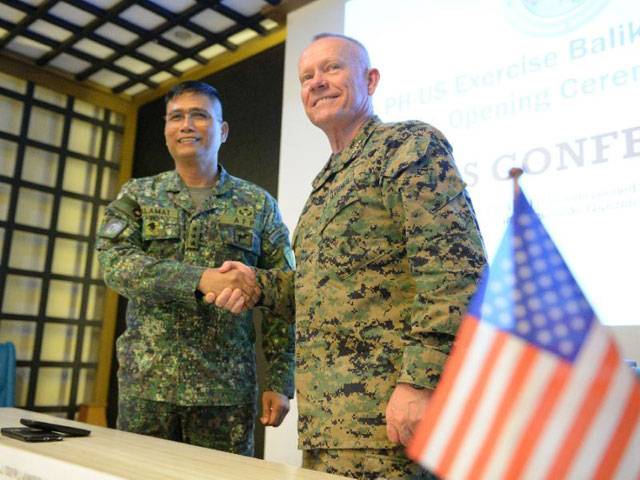MANILA - The US and Philippine militaries launched major exercises Monday aimed at fighting global terrorism, while staying mostly quiet on Beijing's reported installation of missiles in the disputed South China Sea.
The annual manoeuvres are the second to be held under Philippine President Rodrigo Duterte, who has set aside long-simmering friction over competing claims to the waters in order to court Chinese trade and investment.
The 12-day exercises began less than a week after US network CNBC reported that the Chinese military had over the past month installed anti-ship and air-to-air defences on islands also claimed by the Philippines.
"This exercise was scheduled whether those missiles were there or not," US Lieutenant General Lawrence Nicholson told reporters in Manila. "The exercises really have very little to do with recent developments in the area," said Nicholson, the US director of the "Balikatan" ("shoulder-to-shoulder") manoeuvres. The South China Sea issue has been brewing for years, with Vietnam, Malaysia and others also staking claims to waters with vital global shipping routes and what are believed to be significant oil and natural gas deposits. Nicholson's Filipino counterpart, Lieutenant-General Emmanuel Salamat, sidestepped the issue while highlighting the need to improve the capabilities of Filipino forces to fight terrorism.
Duterte's predecessor, Benigno Aquino, had used the exercises to boost the Philippine military's capability to deter China, which claims most of the South China Sea. However, Duterte refocused the joint exercises after he was elected in 2016, steering them towards addressing domestic problems. Last year Balikatan focused mainly on honing humanitarian responses to the Philippines' frequent natural disasters. This year's terror focus comes after Islamic State group supporters seized the southern Philippine city of Marawi in May last year, triggering a five-month battle with US-backed Filipino troops that killed some 1,200 people.
"This is focusing mostly on countering terrorism... that will allow us to respond to a similar scenario in the future," Salamat said.
The US and Australia have pledged to provide more training and assistance to Filipino troops, who struggled in Marawi's urban battleground after decades fighting low-intensity rural-based communist and Muslim insurgencies.
Most of the 5,000 Filipino troops and 3,000 US counterparts taking part in the manoeuvres are from special operations units who will train in mock urban terrain to respond to "crises and calamities, either natural or man-made", Salamat said.
Australia and Japan are also sending a total of 42 military observers to Balikatan, he added.






